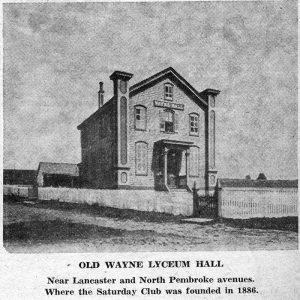With the opening of the Saturday Club of Wayne, on Tuesday, for its 71st season, it seems fitting to include in this column something of the history of the second oldest women’s departmental club in Pennsylvania.
The local organization is second in age only to the New Century Club of Philadelphia, which was founded in 1876, soon after the close of the Centennial in Philadelphia. Among our readers there are many women so new to the community that they may not know that the structure just to the west of the Central Baptist Church building, on West Wayne avenue, is the home of the Saturday Club of Wayne.
 The faded ink of the first minute hook, one of the most cherished possessions of the club, recounts that “on February 16, 1886, at four in the afternoon, nine of the 12 ladies invited to be present met in the Library Room, Wayne Hall, where, after some informal remarks, Miss Markley was invited to preside.” The first order of business was the election of officers. Tellers announced the results of the balloting to be Mrs. James Campbell, for president; Miss Anna Markley and Mrs. P.W. Ver Planck, vice-presidents; Mrs. G.E. Abbott, secretary, and Miss Helen Erben for treasurer.
The faded ink of the first minute hook, one of the most cherished possessions of the club, recounts that “on February 16, 1886, at four in the afternoon, nine of the 12 ladies invited to be present met in the Library Room, Wayne Hall, where, after some informal remarks, Miss Markley was invited to preside.” The first order of business was the election of officers. Tellers announced the results of the balloting to be Mrs. James Campbell, for president; Miss Anna Markley and Mrs. P.W. Ver Planck, vice-presidents; Mrs. G.E. Abbott, secretary, and Miss Helen Erben for treasurer.
The next order of business was a discussion of the meeting place for the new organization. Although there was some opposition to the Wayne Hall, it was finally decided to meet there until a permanent organization should be formed in May. Dues were set at one dollar for the temporary organization and a committee of three, on constitution and by-laws, was appointed. The organizers made themselves a “committee of the whole” on entertainment.
In addition to the officers, the other members of the original group of 12 were Mrs. William Henry Sayen, Miss Phillips, Miss Katharine Wentworth, Miss Simmons, Mrs. Barclay Johnson, Mrs. Peterson and Mrs. Henry Pleasants. A little later (to quote from the minute book), “there were nominated for membership six other ladies, all of whom gave great vitality to the infant club.” They were Miss Matlack, Mrs. Stocker, Mrs. Hughes, Mrs. E.L. Campbell, Miss Mary Rogers and Mrs. Fallon.
The name “Saturday Club” was probably adopted because the men, and there were a few men members then, could attend. When members signified under which committee they wished to work, the results were “three under science, three under literary work, two under art and four under music.” At the meeting of March 27, the constitution and by-laws were adopted.
The description of the informal meeting held before the first formal one is worth quoting. “On a snowy Saturday afternoon, there gathered in Mrs. Sayen’s parlor several bright, congenial women who, over steaming cups of tea, dared discuss the subject of women’s clubs, then almost a tabooed one.” Mrs. Sayen’s home still stands, now housing the Italian-American Club at the corner of West Wayne avenue and Conestoga road.
Programs of the meetings were usually in the form of papers written by members, and were on such diversified subjects as “Climatology,” “Materialism” and “Geology of the Surrounding Country.” There was also, for one program, the reading of a few extracts from a book called “Plumbing and Doctors.” Dr. Seneca Egbert gave a lecture on “Emergencies” and Dr. Wells one on “Nursing.” Mrs. Rohrer, author of the still well-known cook book, talked on “Puff Pastry and Ordinary Pastry.” The Rev. Mr. Keller, of old St. David’s Church, read a paper entitled “Conservatism ought to be the attitude of the Saturday Club.”
At the annual meeting held in April, 1887, it was voted to reduce the regular dues from three dollars to two. However, “all men becoming life members pay three dollars and this gives them a membership for life.” Apparently not many availed themselves of this opportunity, for at a meeting held a year later it was moved “that the money be refunded to those gentlemen who have paid their dues for the year, and that those who have assisted us be elected honorary members.” It would seem that Dr. Egbert and Mr. Abbott had evidently been the only ones who had availed themselves of the opportunity to join the Saturday Club.
(To be Continued)
